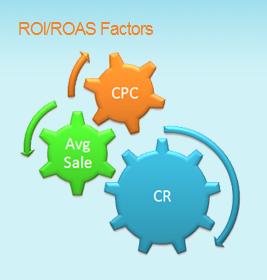I count my lucky stars that my fortunes don’t rely on SEO and PPC alone. I’m happy to be part of a couple of agencies with a full range of interactive and traditional marketing solutions. That means I don’t have to pretend like SEO and PPC always are the best choice for clients. They’re not.
I thought it might be refreshing to talk about when SEO and PPC are NOT a great choice for local businesses- but not just to discourage you- The reasons they don’t work can tell us something about the businesses, what they should do next, what makes a good business in a certain niche, and so on.
First, let’s think about what makes for success in search:
1. Relevant keywords
2. Prospects that convert
3. A competitive advantage or a not too competitive niche
4. Proportion of cost and revenue that creates positive ROI
5. Trackability that can prove that ROI
We’ll look at each of those in the ideal situation, and how problems in each can lead to marketing failures for local businesses.
1. How a Lack of Relevant Keywords Can Doom Search Efforts
I typically divide keywords into two groups:
- Brand names
- Category (general) keywords
The brand searches are the low hanging fruit. If a local business has a strong brand and repeat customers, there’s good ROI here. And you can make it even better by testing ads.
Category keywords could be vertical-related, offering-related, or geomodifiers. For a mexican restaurant, it could be “mexican food”, “myrtle beach restaurant”, or “myrtle beach mexican restaurant”.
Where this breaks down:
–> If you get too long tail; for example, “myrtle beach mexican restaurant with California burritos” isn’t going to show evidence of volume in Google’s Keyword Tool.
–> If your vertical is too competitive, and you’re not near any geomodifiers that get search volume; e.g. a golf course in the boonies on the edge of Florida and Georgia might run into trouble- not committed enough to get good results from either state, not near a big golf tourism city, and “golf” itself is way too competitive in SEO and too expensive in PPC. Add in lack of brand recognition, and you’ve got an uphill battle that looks a lot like a sheer cliff.

2. Why Your Prospects Aren’t Buying From You
Naturally, we need our visitors to do something: if not purchase, then fill out a lead form or get on the email list. One of the three main components of ROI is CR (conversion rate). This pain point has a lot to do with the other four items-
- Keywords: People that search some keywords convert, and people that search others do not. So, if you don’t rank for the high value keywords, or can’t afford to buy them, you won’t get the revenue.
- Competition: The more competitive your niche, the more price shopping there will be, and the lower the conversion rate and ROI. If you can’t win against the competition for the best keywords, you won’t get a positive return.
- ROI: Some searchers come from more expensive keywords, and each keyword produces a different CR and amount of revenue. If competition drives down average sale, ROI may be negative.
- Tracking: If you’re doing purchases, you have to track the revenue per sale, and if you’re doing leads, you have to track the form submissions- KPI is either ROI or Cost per Conversion. If you have trouble with IT getting your conversion tracking or analytics implemented, you won’t be able to prove the value of your SEO and PPC.
3. Bleeding Out Due to Lack of Competitive Advantage
Too many businesses never think this through. Why should they choose you over your competition? What do you have that matters to your prospects that they can’t get elsewhere?
In the really competitive markets, often no business has a real advantage. Then price wars begin, and you’re either Wal-Mart, or you’re dead. This is called a red ocean, because all the fish are eating each other.
The problem with its opposite, the blue ocean, is that if your offering is so new that competition is low, few people know about it- and search capitalized on existing demand via search queries. So you might need a more attention-grabbing story-telling medium like TV, radio, or social media instead. If you’re lucky, you can attach it to a category keyword, but your conversion rate may be low because people are still trying to figure out what you are and if they like it. So you either need a lot of money and patience, or you luck out and get into a category that’s not as competitive as mesothelioma lawyers or online dating.
But if you have no competitive advantage, you’re in danger of low average sales due to price wars, and low conversion rates because no one is really attached to you solving their problem.
4. ROI Undercut by High Cost and Low Conversion Rate
As we’ve discussed already, in PPC, the cost of the keywords can undercut ROI. And if your product is priced low, revenue will be low as well. If you have conversion rate problems, it takes more clicks to get that revenue.
Really, this is just math. The question is if the cost is low enough, the average sale high enough, and the conversion rate good enough. Use this PPC ROI Calculator to play out a variety of scenarios, and you begin to grasp how they’re related.
The worst situation for local businesses is if you don’t have a brand name or mindshare, and you have to go into category keywords. These keywords are much more expensive, and the searchers are window shopping more, which brings the conversion rate down.
We’ve seen with tourist destinations with lots of independent hotels that the single hotel owners have more difficulty. It’s easier for groups with multiple hotels to offer a portal site that satisfies the window shoppers yet retains the sale for one member of the group. Solo hotels are competing against these groups, national chains, AND the megasites like TripAdvisor.
These lonely go-it-aloners don’t get great ROI on category keywords in PPC, and they don’t have the content or authority to get many searches for those category keywords via SEO.
5. Untrackable Advertising Creates Doubt and Shuts Down Efforts
If you don’t have tracking, the more skeptical local businesses will assume they’re getting nothing for their efforts. Or if all business is bad, they may assume SEO and PPC aren’t doing anything either. In fact, it could be that most of their business is coming from SEO and PPC, but if you aren’t tracking it, they won’t know. Shutting down those efforts would not only hurt the search provider but also the business.
On the flipside, counterintuitively, some local businesses refuse to believe the numbers. This reminds me of a study I read years ago about doctors reading research. They tended to believe research that confirmed their biases, but if they found research that ran counter to their beliefs, they questioned the study’s methodology. I’ve also seen people question the researchers’ motives. We need to be aware of this very human tendency in ourselves when we look at our analytics.
The best local business owners use a combination of common sense, business wisdom, analytics and research, and also trust in their expert help.
7 Tips for Local Business SEO/PPC Success
The above is all rather negative. I’ll leave you with 7 tips for Local Search Success, the positive prescription for how to beat all those problems and win at the local search game:
1. Don’t start a business in the middle of nowhere
2. Don’t start a business in a blue ocean without a bunch of money
3. Research keywords before starting new business efforts
3. Create a competitive advantage if you don’t have one
4. Create a Brand and an Email List
5. Avoid price wars if you can
6. Use analytics and conversion tracking to guide optimization and prove ROI
7. Let your business wisdom and web analytics have a dialogue




![AI Overviews: We Reverse-Engineered Them So You Don't Have To [+ What You Need To Do Next]](https://www.searchenginejournal.com/wp-content/uploads/2025/04/sidebar1x-455.png)